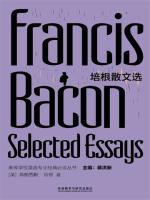Timeless Wisdom
董金萌
Timeless Wisdom in the Age of Noise: A Review of Francis Bacon’s Essays
In an era dominated by fleeting soundbites and superficial connections,
Francis Bacon’s Essays stands as an unyielding monument to deliberate
thought. Hailed as the cornerstone of English essay literature, this
collection of concise reflections from the "father of English
materialism" and pioneer of experimental science retains a striking
relevance four centuries after its first publication in 1597 . It offers
not mere philosophical musings, but a practical guide to navigating the
complexities of human life that resonates as deeply today as it did in
the Renaissance. Bacon’s greatest strength lies in his ability to
distill profound insights into crystalline prose. Each essay, though
short enough to read in minutes, demands days of reflection—a testament
to its extraordinary information density . His aphoristic style,
characterized by sharp, memorable statements, transforms abstract ideas
into tangible wisdom. In Of Studies, he articulates a timeless framework
for intellectual growth: "Reading maketh a full man; conference a
ready man; and writing an exact man" . This observation about
knowledge acquisition feels prophetic in our age of information
overload, where his advice to "read not to contradict and confute,
nor to believe and take for granted" serves as an essential
antidote to uncritical consumption. What makes the collection truly
enduring is its encyclopedic scope and prescient understanding of human
nature. Bacon explores nearly every facet of human experience—politics,
ethics, friendship, beauty, and adversity—with a balanced, pragmatic
eye. In Of Truth, he diagnoses a flaw still prevalent in our post-truth
era: "People prefer falsehood not only because the search for truth
is arduous, but because lies better cater to certain base human
instincts" . In Of Friendship, he counters our age of virtual
connectivity with the assertion that "a man without friends is like
one in a wilderness," reminding us of friendship’s irreplaceable
role in emotional and intellectual flourishing.Even his reflections on
adversity—"The virtue of prosperity is temperance; the virtue of
adversity is fortitude"—bear the weight of lived experience, forged
from his own political downfall . Critics have occasionally accused
Bacon’s work of superficiality or elitism, noting his tendency toward
generalization and his focus on educated elites . Yet these critiques
miss the collection’s core purpose: to offer accessible, actionable
wisdom rather than exhaustive philosophical treatises. Bacon synthesizes
classical ideas into a practical framework, making timeless wisdom
available to those seeking to navigate life with intention His prose,
while concise, is far from shallow—each sentence is a distillation of
years of observation and reflection, enriched by historical and literary
allusions that add layers of meaning. Francis Bacon’s Essays endures
because it addresses universal human needs: the desire for truth, the
struggle with vice, the pursuit of meaningful connection, and the quest
for purpose. In a world that often values speed over depth, Bacon’s work
invites us to pause, reflect, and ground our lives in principles that
have stood the test of time. As we grapple with the same questions of
human nature and conduct that occupied Bacon four centuries ago, this
collection remains not just a literary classic, but a vital source of
clarity—a reminder that true wisdom is neither dated nor distant.



 京公网安备 11010802032529号
京公网安备 11010802032529号